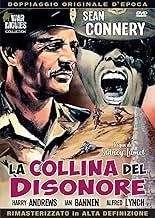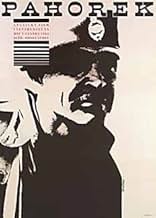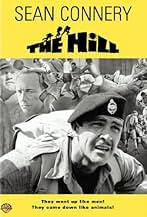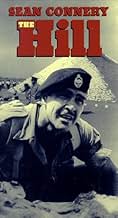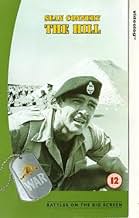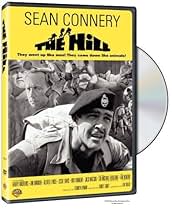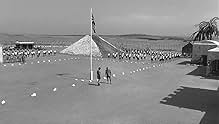IMDb-BEWERTUNG
7,8/10
16.051
IHRE BEWERTUNG
In einem nordafrikanischen Militärgefängnis während des Zweiten Weltkriegs kämpfen fünf neue Gefangene angesichts brutaler Bestrafung und sadistischer Wachen ums Überleben.In einem nordafrikanischen Militärgefängnis während des Zweiten Weltkriegs kämpfen fünf neue Gefangene angesichts brutaler Bestrafung und sadistischer Wachen ums Überleben.In einem nordafrikanischen Militärgefängnis während des Zweiten Weltkriegs kämpfen fünf neue Gefangene angesichts brutaler Bestrafung und sadistischer Wachen ums Überleben.
- 1 BAFTA Award gewonnen
- 4 Gewinne & 6 Nominierungen insgesamt
Michael Redgrave
- The Medical Officer
- (as Sir Michael Redgrave)
Michael Hawkins
- Prisoner
- (Nicht genannt)
James Payne
- Man in Prison
- (Nicht genannt)
Robert Royal
- Prisoner
- (Nicht genannt)
Harold Sanderson
- Officer
- (Nicht genannt)
Empfohlene Bewertungen
10tully-2
"The Hill" is the first of five films Sean Connery made with Sidney Lumet, and is one of the best, largely because it focuses on ensemble acting, and because each of the actors are up to the task.
The film is set in a North African prison camp during World War II, where a group of five inmates (Connery, Ossie Davis, Roy Kinnear, Alfred Lynch and Jack Watson) have just been assigned. The Sergeant-Major who runs things at the camp (Harry Andrews) has a novel theory about rehabilitation -- break down the wills of the inmates by repeatedly running them up and down a sandy hill built in the middle of the compound, then rebuild them as model soldiers. Despite the martinet-type attitude, Connery and each of his fellow inmates begins to rebel against Andrews and his new, sadistic assistant (Ian Hendry), culminating in the death of one of the inmates and the consequent attempt to cover up the incident.
In black-and-white, Lumet has done a remarkable job of giving the location the feel of hell-on-earth, and his noted ability to work with actors is visible here. Connery is excellent in the second-best performance of his career (the best was his 1973 performance in "The Offence", also with Lumet directing) as a career soldier whose not all that certain that the Army's outdated discipline is worth anything. Equally good performances are turned in by Davis as a West Indian soldier who takes the racist barbs of his jailers and rebels in his own, unique way; Watson as a brutish inmate who begins to develop a conscience; Ian Bannen as a sympathetic guard; Lynch as a sensitive man not meant for the army or jail; Andrews; and Michael Redgrave as the ineffectual doctor who finds courage at the crucial moment.
Probably the best performance, however, is turned in by Hendry as the deeply insecure, sadistic loose cannon of a guard who truly sets events in motion. At once, his performance is villanous, but with an edge of immaturity that makes it almost difficult to hate him -- until the end when the other characters really begin to appreciate just how dangerous he is.
Unfortunately, this film was ignored by the Oscars -- a tragedy especially from some actors who have/had generally been ignored by the Academy and other awards groups (i.e., Connery, Hendry, Andrews, Davis). It did, however, win an award at the Cannes Film Festival for Ray Rigby's superb screenplay.
You may need to listen close to pick up some of the dialogue, but by all means, see it if you get the chance.
The film is set in a North African prison camp during World War II, where a group of five inmates (Connery, Ossie Davis, Roy Kinnear, Alfred Lynch and Jack Watson) have just been assigned. The Sergeant-Major who runs things at the camp (Harry Andrews) has a novel theory about rehabilitation -- break down the wills of the inmates by repeatedly running them up and down a sandy hill built in the middle of the compound, then rebuild them as model soldiers. Despite the martinet-type attitude, Connery and each of his fellow inmates begins to rebel against Andrews and his new, sadistic assistant (Ian Hendry), culminating in the death of one of the inmates and the consequent attempt to cover up the incident.
In black-and-white, Lumet has done a remarkable job of giving the location the feel of hell-on-earth, and his noted ability to work with actors is visible here. Connery is excellent in the second-best performance of his career (the best was his 1973 performance in "The Offence", also with Lumet directing) as a career soldier whose not all that certain that the Army's outdated discipline is worth anything. Equally good performances are turned in by Davis as a West Indian soldier who takes the racist barbs of his jailers and rebels in his own, unique way; Watson as a brutish inmate who begins to develop a conscience; Ian Bannen as a sympathetic guard; Lynch as a sensitive man not meant for the army or jail; Andrews; and Michael Redgrave as the ineffectual doctor who finds courage at the crucial moment.
Probably the best performance, however, is turned in by Hendry as the deeply insecure, sadistic loose cannon of a guard who truly sets events in motion. At once, his performance is villanous, but with an edge of immaturity that makes it almost difficult to hate him -- until the end when the other characters really begin to appreciate just how dangerous he is.
Unfortunately, this film was ignored by the Oscars -- a tragedy especially from some actors who have/had generally been ignored by the Academy and other awards groups (i.e., Connery, Hendry, Andrews, Davis). It did, however, win an award at the Cannes Film Festival for Ray Rigby's superb screenplay.
You may need to listen close to pick up some of the dialogue, but by all means, see it if you get the chance.
It isn't often Sean Connery makes a film which becomes more memorable than his efforts to make it. Such is the way with a few he decided not mention in his filmography, such as "Safu." You must see it to realize that despite Connery, the film must have a true message. Such is the case with "The Hill." This film does have a message and it is harsh, brutal and to the point. The setting is a British military prison located in the desert and stocked with ex-soldiers who've been court martialed and now must be repatriated by backbreaking discipline, and grim punishment. With inmates coming and going at the prison, it is not too difficult to imagine a new lot which includes Joe Roberts (Sean Connery) a broken Sgt. Major. Pvt. Jacko King (Ossie Davis, who is superb in this role) Pvt. Alfred Lynch, (George Stevens) Pvt. Monty Bartlett (Roy Kinnear) and Pvt. Jock McGrath (Jack Watson). These men and others are new inmates and are pitted against the ruling officers who, will receive as much as they give. This includes the governing Non-commission staff like, Royal Sgt. Major Bert Wilson (Harry Andrews, superb acting) and Sgt. Harris (Ian Bannen) who despite their station are set to collide with each other as well as with the prisoners. Upon entering the prison, the audience is allowed to see how the men will be affected as they are introduced to the punishing ordeal of . . . The Hill. ****
This was one of the most poinant lines of the film, neatly summarising the general mood and feeling of the characters.
A lot of people think that this is an anti-war film, which to some degree it is. More accurately, however, it could be labelled an anti-army film. Interestingly enough both views could be maintained without there being any real warfare displayed on the screen. This is a measure of how powerful the film is.
The fighting which we see is actually between the various prison officers and convicts. The film does not simply divide them into opposing groups, but rather explores the differences and tensions between the people who are in power and those who are subject to it.
Like 'Full Metal Jacket', many years later, this movie is a condemnation of the dehumanising process soldiers are forced to go through in order to survive the army. Military prison, as we learn, is a further step down into the merciless and brutal world of the army.
If 'The Hill' was made today, the violence we see would undoubtedly be more explicit and obvious. However, this does not take away anything from the original , as it is the mental torture more than the physical suffering which is portrayed so well in Lumet's work.
It has aged fairly well, mainly due to the accomplished and original way the film is shot and the script is written. Camera angles to induce feelings of dominance, claustrophobia and pressure are utilised perfectly as are the varying degrees of light and dark contrast which accentuates the blazing sun. Every actor is well cast and gives well judged performances, most career bests. Those that stand out are Bannen, Hendry, Connery and Andrews.
At the core of the film is the struggle between Andrews and Bannen's respective characters for ultimate authority in the prison. The bittersweet ending shows that Andrews' charcter, although shaken, will still reign in the hellhouse of a military prison.
Superb, thought provoking film, that rewards the viewer for staying with it as the powerful ending is reached.
A lot of people think that this is an anti-war film, which to some degree it is. More accurately, however, it could be labelled an anti-army film. Interestingly enough both views could be maintained without there being any real warfare displayed on the screen. This is a measure of how powerful the film is.
The fighting which we see is actually between the various prison officers and convicts. The film does not simply divide them into opposing groups, but rather explores the differences and tensions between the people who are in power and those who are subject to it.
Like 'Full Metal Jacket', many years later, this movie is a condemnation of the dehumanising process soldiers are forced to go through in order to survive the army. Military prison, as we learn, is a further step down into the merciless and brutal world of the army.
If 'The Hill' was made today, the violence we see would undoubtedly be more explicit and obvious. However, this does not take away anything from the original , as it is the mental torture more than the physical suffering which is portrayed so well in Lumet's work.
It has aged fairly well, mainly due to the accomplished and original way the film is shot and the script is written. Camera angles to induce feelings of dominance, claustrophobia and pressure are utilised perfectly as are the varying degrees of light and dark contrast which accentuates the blazing sun. Every actor is well cast and gives well judged performances, most career bests. Those that stand out are Bannen, Hendry, Connery and Andrews.
At the core of the film is the struggle between Andrews and Bannen's respective characters for ultimate authority in the prison. The bittersweet ending shows that Andrews' charcter, although shaken, will still reign in the hellhouse of a military prison.
Superb, thought provoking film, that rewards the viewer for staying with it as the powerful ending is reached.
Gritty emotional story of men being subjected to ill treatment at a British Army disciplinary camp in the desert. Human drama is of interest to anyone who has been a cog in a corporate machine, not just a veteran. Symbolic of human defiance in the face of rigid rules and inconsiderate authority.
Excellent cast takes every opportunity of limited time frame to give their characters amazing depth. Every character is fully realized and recognizable by anyone who has a few tough life experiences.
Naturally as good as the other actors are, the focus will always be on Connery's screen presence. Here he seems to be portraying his true personality, his face never suited Bond as much. Tough, self respecting and self disciplined sergeant who resolves not to lose his dignity in the face of harsh cruelty. This is an amazing performance, and it's too bad we don't use men like this as role models in modern American society.
As good as the performances are, the best thing about this film is the photography---check out the 360 degree camera movement during the opening sequence. It's a masterpiece which is rare to see even today.
Excellent cast takes every opportunity of limited time frame to give their characters amazing depth. Every character is fully realized and recognizable by anyone who has a few tough life experiences.
Naturally as good as the other actors are, the focus will always be on Connery's screen presence. Here he seems to be portraying his true personality, his face never suited Bond as much. Tough, self respecting and self disciplined sergeant who resolves not to lose his dignity in the face of harsh cruelty. This is an amazing performance, and it's too bad we don't use men like this as role models in modern American society.
As good as the performances are, the best thing about this film is the photography---check out the 360 degree camera movement during the opening sequence. It's a masterpiece which is rare to see even today.
The Hill is a brutal film to watch. It stars a (relatively) young Sean Connery as he attempts to avoid being typecast as James Bond and features recognizable British actors in support. It's a psychological thriller set in a prison camp for court-martialed British soldiers, a rugged, terrifying camp run by a ruthless sergeant-major, played by Harry Andrews.
Connery is Joe Roberts, in the klink for slugging a superior officer after refusing to (re)enter the field of battle (his squad was hopelessly outnumbered and outflanked; see also Paths of Glory). Roberts is tossed in a cell with fellow cons George Stevens (Alfred Lynch), Jacko King (Ossie Davis), Monty Bartlett (Roy Kinnear), and Jock McGrath (Jack Watson), who alternately resent and respect Roberts' actions.
The hill of the title is a steep, sandy incline in the middle of the Sahara, where the camp's located. Convicts are tasked with double-timing it up one side and down the other, carrying a loaded backpack and their kit, or duffel bag. And then back again. The hill is used as a way for RSM Wilson (Andrews) to break them, to make them into real soldiers again.
Trouble arises when Wilson's second in command, Staff Sergeant Williams (Ian Hendry) badgers one of the convicts so relentlessly that the man dies, thus kicking the battle of wits between prisoner and gatekeeper to an entirely new level. And this is where we really begin to see the unvarnished war of man versus man, as Wilson and Williams strain to break not only Roberts but also his cellmates.
Connery is really fantastic as the strong-willed Roberts, and Wilson – who played plenty of authoritarian, stiff-backed British characters, is his equal. It's good to see Connery in a movie that transcends his sex appeal and his association with a certain superspy. Filmed in stark black and white (as black and white tends to be), The Hill is near the apex of psychological war films.
Connery is Joe Roberts, in the klink for slugging a superior officer after refusing to (re)enter the field of battle (his squad was hopelessly outnumbered and outflanked; see also Paths of Glory). Roberts is tossed in a cell with fellow cons George Stevens (Alfred Lynch), Jacko King (Ossie Davis), Monty Bartlett (Roy Kinnear), and Jock McGrath (Jack Watson), who alternately resent and respect Roberts' actions.
The hill of the title is a steep, sandy incline in the middle of the Sahara, where the camp's located. Convicts are tasked with double-timing it up one side and down the other, carrying a loaded backpack and their kit, or duffel bag. And then back again. The hill is used as a way for RSM Wilson (Andrews) to break them, to make them into real soldiers again.
Trouble arises when Wilson's second in command, Staff Sergeant Williams (Ian Hendry) badgers one of the convicts so relentlessly that the man dies, thus kicking the battle of wits between prisoner and gatekeeper to an entirely new level. And this is where we really begin to see the unvarnished war of man versus man, as Wilson and Williams strain to break not only Roberts but also his cellmates.
Connery is really fantastic as the strong-willed Roberts, and Wilson – who played plenty of authoritarian, stiff-backed British characters, is his equal. It's good to see Connery in a movie that transcends his sex appeal and his association with a certain superspy. Filmed in stark black and white (as black and white tends to be), The Hill is near the apex of psychological war films.
Wusstest du schon
- WissenswertesFilming took place in Almería, Spain in a sandy wasteland called Cabo de Gata starting in September 1964 for five weeks on location. An old Spanish fort in Málaga was used for the prison.
Many people associated with the production had regarded the filming as pleasant, despite difficult conditions---The temperatures rarely fell below 115 degrees Fahrenheit (46 degrees Celsius), and despite the 2,000 gallons of pure water that were shipped in for the crew, almost everyone succumbed to dysentery during the shoot.
- PatzerThe first time the new arrivals are shown around "the hill" by Staff Williams, the shadow of the rig is clearly visible as the camera performs a 360 degree shot from the top of the hill.
- Zitate
Trooper Joe Roberts: We're all doing time. Even the screws.
- Alternative VersionenColorized version was broadcast over TNT Network June 7, 1989.
- VerbindungenFeatured in The Sun... the Sand... the Hill. (1965)
Top-Auswahl
Melde dich zum Bewerten an und greife auf die Watchlist für personalisierte Empfehlungen zu.
- How long is The Hill?Powered by Alexa
Details
- Erscheinungsdatum
- Herkunftsländer
- Sprache
- Auch bekannt als
- Hügel der verlorenen Männer
- Drehorte
- Produktionsfirmen
- Weitere beteiligte Unternehmen bei IMDbPro anzeigen
Box Office
- Budget
- 2.500.000 $ (geschätzt)
- Laufzeit
- 2 Std. 3 Min.(123 min)
- Farbe
- Seitenverhältnis
- 1.85 : 1
Zu dieser Seite beitragen
Bearbeitung vorschlagen oder fehlenden Inhalt hinzufügen


